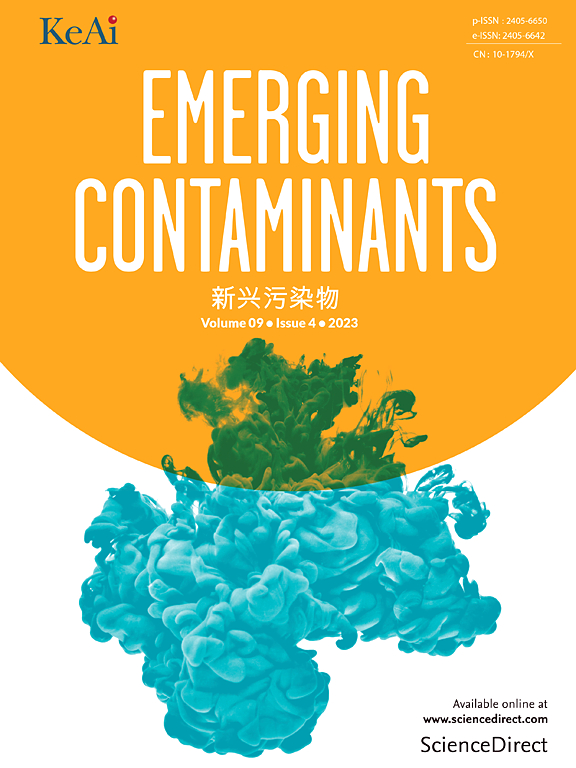Study on interaction, feedback, and response between perfluorinated compounds and soil environments
IF 5.3
2区 环境科学与生态学
Q1 ENVIRONMENTAL SCIENCES
引用次数: 0
Abstract
The soil environment plays a crucial role in agricultural production, safeguarding water resources, and maintaining ecological balance. Additionally, the soil environment can regulate climate through carbon cycling and serves as an essential habitat for the survival of animals and humans. Therefore, a green and healthy soil environment forms the bedrock of sustainable development of biological systems and serves as the basic support for socio-economic progress, thereby affecting the survival of every organism. However, with the advancement of human society and technology, numerous emerging pollutants have gradually been identified. Among these pollutants, perfluorinated compounds (PFASs) are known for their high thermal stability, bioaccumulation potential, and strong biological toxicity. PFASs are complex persistent pollutants that infiltrate soil ecosystems through industrial emissions, agricultural practices, and household waste, posing a significant threat to soil environments as well as human health and receiving considerable attention. However, current research mainly focuses on PFASs pollution in water media, with few reports on its interaction with soil environments. Moreover, due to the diversity and heterogeneity of soil environmental factors, the species diversity of PFASs may affect the different responses between different PFASs (short and long chain types) and soil factors. Elucidating these complex relationships is crucial for developing future treatment technologies to remediate PFASs pollution. Therefore, this paper reviews the impacts of PFASs pollution on soil properties and preliminarily compares the response and effect of various environmental factors, such as pH, organic matter, and microbial communities, to PFASs stress. Furthermore, the paper provides a scientific basis and theoretical insights into the processes, transformation mechanisms, and remediation methods related to soil PFASs pollution.

全氟化合物与土壤环境之间的相互作用、反馈和响应研究
土壤环境在农业生产、保护水资源和维持生态平衡方面发挥着至关重要的作用。此外,土壤环境还能通过碳循环调节气候,是动物和人类生存的重要栖息地。因此,绿色健康的土壤环境是生物系统可持续发展的基石,也是社会经济进步的基础支撑,进而影响着每一个生物的生存。然而,随着人类社会和科技的进步,人们逐渐发现了许多新出现的污染物。在这些污染物中,全氟化合物(PFASs)以其高热稳定性、生物蓄积潜力和强烈的生物毒性而著称。PFASs 是一种复杂的持久性污染物,通过工业排放、农业生产实践和生活垃圾渗入土壤生态系统,对土壤环境和人类健康构成重大威胁,受到广泛关注。然而,目前的研究主要集中在水介质中的 PFASs 污染,有关其与土壤环境相互作用的报道很少。此外,由于土壤环境因子的多样性和异质性,PFASs 的物种多样性可能会影响不同 PFASs(短链和长链类型)与土壤因子之间的不同反应。阐明这些复杂的关系对于开发未来修复 PFASs 污染的处理技术至关重要。因此,本文综述了 PFASs 污染对土壤性质的影响,并初步比较了各种环境因素(如 pH 值、有机物和微生物群落)对 PFASs 压力的响应和影响。此外,本文还对土壤 PFASs 污染的相关过程、转化机制和修复方法提供了科学依据和理论见解。
本文章由计算机程序翻译,如有差异,请以英文原文为准。
求助全文
约1分钟内获得全文
求助全文
来源期刊

Emerging Contaminants
Medicine-Public Health, Environmental and Occupational Health
CiteScore
10.00
自引率
6.70%
发文量
35
审稿时长
44 days
期刊介绍:
Emerging Contaminants is an outlet for world-leading research addressing problems associated with environmental contamination caused by emerging contaminants and their solutions. Emerging contaminants are defined as chemicals that are not currently (or have been only recently) regulated and about which there exist concerns regarding their impact on human or ecological health. Examples of emerging contaminants include disinfection by-products, pharmaceutical and personal care products, persistent organic chemicals, and mercury etc. as well as their degradation products. We encourage papers addressing science that facilitates greater understanding of the nature, extent, and impacts of the presence of emerging contaminants in the environment; technology that exploits original principles to reduce and control their environmental presence; as well as the development, implementation and efficacy of national and international policies to protect human health and the environment from emerging contaminants.
 求助内容:
求助内容: 应助结果提醒方式:
应助结果提醒方式:


